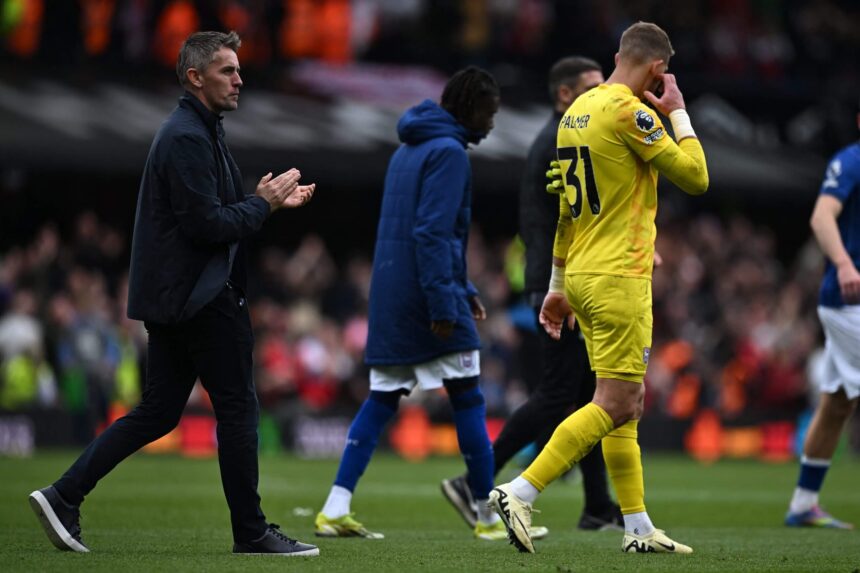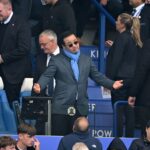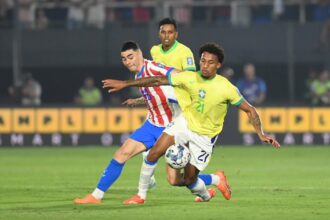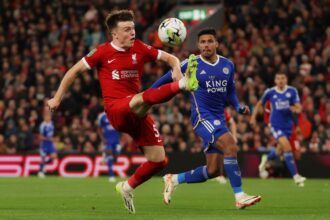Declan Rice looked over his shoulder; he was wondering what the noise was. It was about a minute after the final whistle, players were milling in the middle of the pitch, Kieran McKenna and Mikel Arteta had been to the officials to shake hands. From there, McKenna moved to the stand named after Sir Bobby Robson and began to salute the many fans still in the stadium.
Advertisement
This had been a sobering 90 minutes for Ipswich Town, a 20th defeat in 33 games, an occasion when the gulf between players bound for a Champions League semi-final and those who rose from League One, and who will soon be back in the Championship, was glaring.
Four-nil did not flatter Arsenal, who, if they needed to score eight, probably could have. Even before Ipswich went down to 10 men in the 32nd minute — Leif Davis shown a straight red card for a feckless foul on Bukayo Saka — Arsenal were 2-0 ahead. Their dominance was complete and almost nonchalant. Ipswich had 25 per cent possession by the end, which was better than the 5 per cent after the first seven minutes.
So it was a long day. And Ipswich’s relegation will surely be confirmed on Saturday away at Newcastle United.
And yet the noise stirring Rice was the sound of Portman Road applauding. The recipients of the applause were McKenna and his players.
Here was a beaten team, all but relegated, with Arsenal fans taunting: “We’ll never play here again,” in the air.
But the collective message was one of unity. Any dissent was inaudible. There are stickers on lampposts in town with McKenna’s name in the shape of certain golden arches, and there seems to be no dilution of Suffolk belief in the 38-year-old Northern Irishman.
McKenna applauds after the loss to Arsenal (Ben Stansall/AFP/Getty Images)
Zoom in and this was too passive a performance from Ipswich. Davis’s aggression was not representative. Locals have witnessed only one home league win — against Chelsea — and it must be addressed next season. Then again, McKenna said Arsenal’s opening half hour was “maybe the highest standard we’ve faced. We were absolutely at full stretch”.
Zoom out and you remember Ipswich have come so far, so fast, and the players are breathless. This is why there is so little frustration or anger in the stands.
Advertisement
“It’s a massive testament to the supporters,” McKenna said of the full-time response. “There are mixed emotions because you’re so honoured and humbled by it, but you’re disappointed because you’d like to have given them a different outcome.
“We’ve got a fantastic supporter base and they know the group is giving everything.
“If we keep doing the right things, we can use this setback to push us forward. Things aren’t always on the upward trajectory.
“We’d have loved to have gone promotion, promotion, establish. The first two bits of that journey have been incredible and we’ve not quite been able to do the third bit, but there are other ways to keep developing and build this club back to being a Premier League football club.”
On Friday at the club’s training ground on the outskirts of the town, McKenna was keen to focus on Arsenal and not much else. But he has stuck a spade in the ground of a £30million ($40m) expansion of the Rushmere site and been involved in its planning.
And a stocktake of sorts has begun. This applies to the club but also to McKenna. This time last year, it seemed as if there were ‘Wanted’ posters of him in boardrooms across the Premier League. He was named manager of the season by the League Managers’ Association ahead of Arteta and Pep Guardiola. Outside interest prompted Ipswich to offer a new four-year deal. After plenty of thought, McKenna signed it.
Twelve months on, the demand elsewhere might not be the same, which demonstrates football’s fickle fashions and the difficulties Ipswich have encountered this season.
Sunday’s four Arsenal goals took the number Ipswich have conceded past 70. There have been only four wins, and after the recent victory at Bournemouth, McKenna said the players need the “validation” of winning.
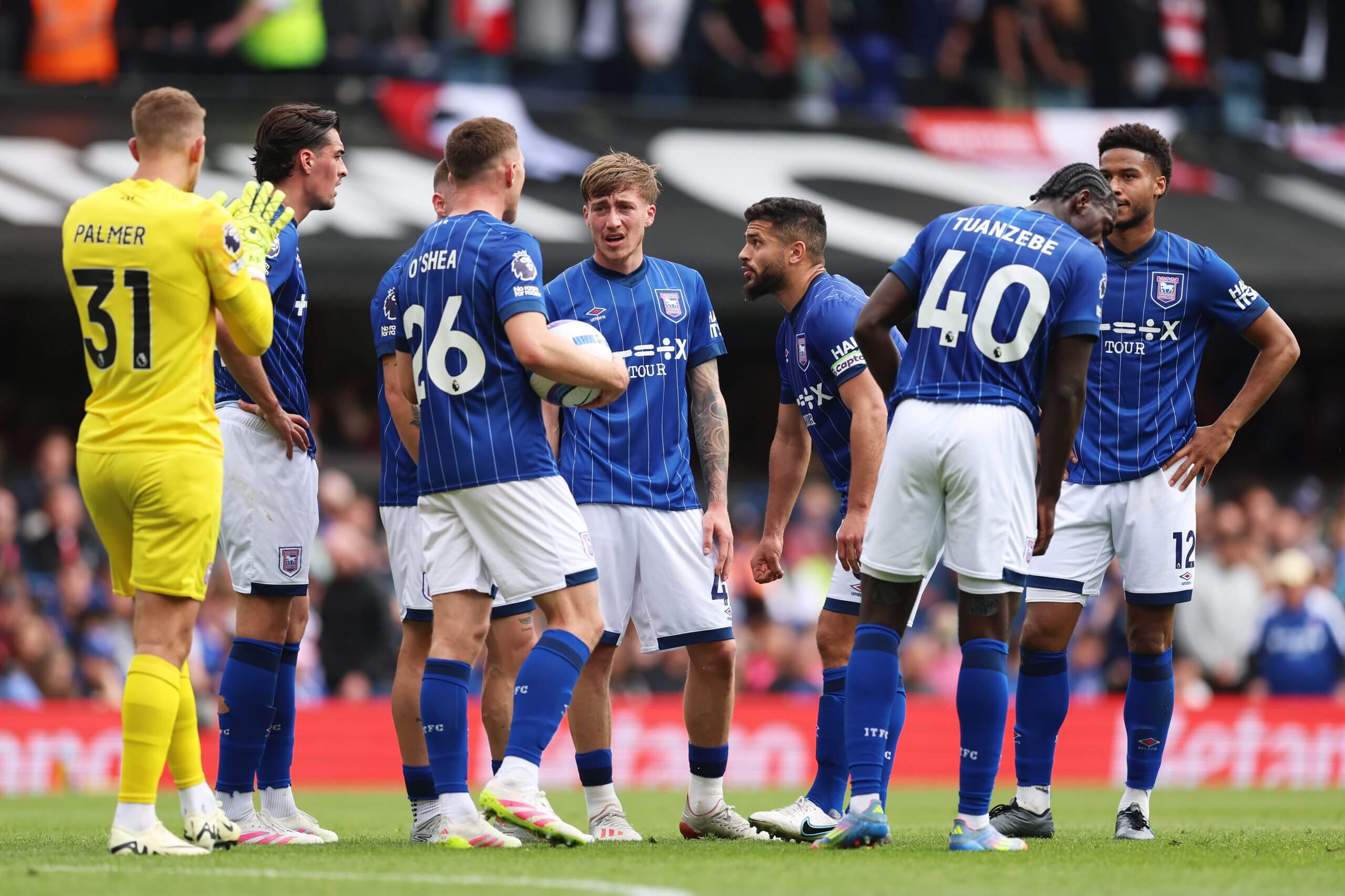
It has been a hard season for Ipswich’s players, with just four league wins (Julian Finney/Getty Images)
On Friday, The Athletic asked if, as a coach, he shares that need for internal and external vindication? “Not massively,” McKenna replied, “probably not as much as players need it, certainly new players. And certainly not as much as the external perception is.
“I’ve always trusted my gut in terms of whether I believe I’m working well or the staff is working well, whether we’re working to the maximum of our ability and our values. If we’re doing that, I’ve always been pretty good at knowing that the result of a football match can be determined by a lot of things outside your control.
Advertisement
“It (winning) doesn’t change loads for me. You feel a lot better and it helps the mood, but in terms of validation, no, I’ve always believed you need some other gauges as to how you’re working. The staff, myself and the players have done a lot of good work this year, work that will hopefully stand us in good stead.”
Will he be a better coach for this season?
“I’d like to think so. If any of us staff, players don’t come out of the season wiser, stronger, better, then you’ve probably not tackled the challenge in the right way. I am and I certainly will be (better).
“That’s been the case throughout my career. When you do well at something, people think it’s been a straight, linear progression. But in my experience, whether that’s as a player or coach, it’s the setbacks that generally have made me stronger. It’s the bumps in the road that fortify you.”
At Ipswich, some historical context is worth recalling: it is a rare young coach who does not face hardship and the men with statues outside Portman Road — Alf Ramsey and Robson — each knew it here.
Ramsey, 35 when appointed in 1955, lost his first game as manager 2-0 at home to Torquay in the old Third Division South, the third tier. One newspaper, the East Anglian Daily Times, said it was “as poor a performance as one can recollect at Portman Road”.
At the start of Ramsey’s second season in charge, Ipswich won one of their first nine games, lay third-bottom and crowds were plummeting. Ramsey pleaded via the local press for understanding. It was given, Ipswich were promoted to the Second Division, then to the First and in 1961-62, to the consternation of the country, became champions of England.
The club’s reputation for boardroom patience was there already, but the Ramsey experience buttressed it and even when Robson, 35 when appointed in 1969, heard chants of “Robson out” in his second season, the club stayed loyal.
And that was before Robson had a stand-up fight with two players, Tommy Carroll and Bill Baxter. “Punches were thrown,” Robson wrote in his 1998 autobiography. “It took me a good three years to learn my trade and sort out that club.”
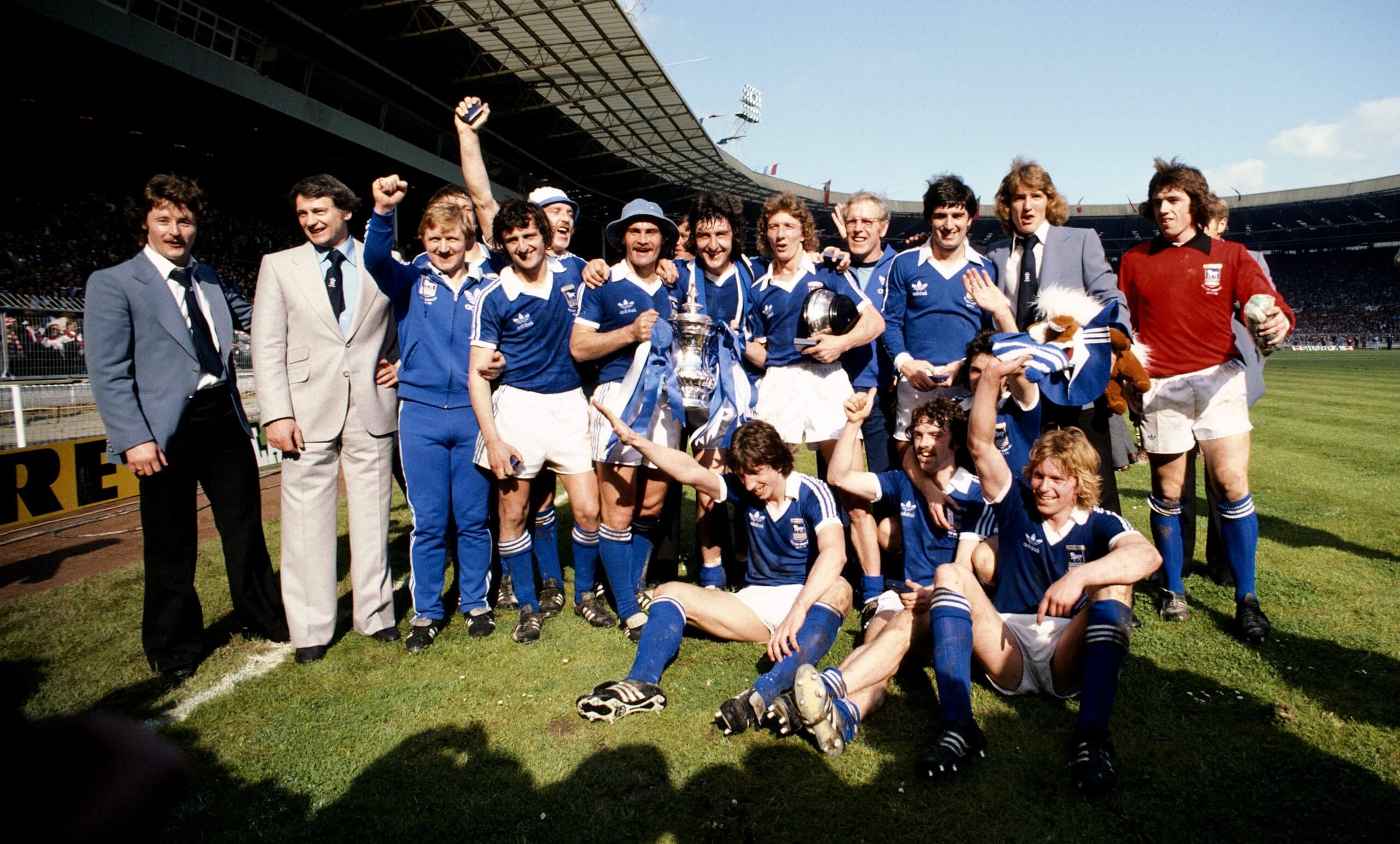
Bobby Robson, left, in the beige suit, eventually won the FA Cup and UEFA Cup at Ipswich (Allsport/Getty Images)
McKenna was also 35 when appointed in December 2021, with Ipswich stale in mid-table League One. Sitting 11th, four points behind the team immediately above them, Accrington Stanley, he did not need that long. Supported structurally and financially by the club’s American owners — since 2021 — in his first two full seasons, McKenna organised two promotions to bring afternoons like Sunday back to Ipswich after more than two decades outside the top division.
Advertisement
Chelsea last weekend, Arsenal this, a trip to St James’ Park next — this is what the work was for. So was hosting Liverpool on the opening day of the season. Conor Chaplin used the word “validation” in yesterday’s programme and noted “nine of us who got on the pitch that day played for the club in League One”.
McKenna calls Ipswich’s rise “unique” in modern times and, taken back to his first team-talk as Town manager, before a game against Wycombe Wanderers, he said he personally is “mostly the same” man.
“It was my first day as a manager but it wasn’t my first day on the school run. I was the best part of a decade and a half on my coaching journey, most things were pretty well-established in terms of how I wanted to train, be with players, how I wanted my team to play.
“There’s no doubt you’re stronger for the rounding of experiences, taking over a team in the middle of League One, then the last three seasons.”
Without pausing, he broke down those seasons, beginning in the third tier: “You’re in charge of a really big club for the division with a good budget and a great fanbase — that brings its own challenges. Of course, that was successful.
“Last season (in the Championship) we’re in charge of a big club but, really, with a bottom-half, bottom-third budget and low expectations. We managed to do something incredible, something of that ilk hasn’t been done very often.
“And then this season, you’re in charge of the team that has the smallest wage budget by far, hasn’t been in the Premier League for 22 years, but still has a great history, tradition and pride.
“We tried to attack the division as well as we can but that’s a completely different challenge to two seasons ago in League One — the way you can play, certain things you can ask of players. The level of the opponent relative to the strengths of your team had flipped completely in the last couple of years.
“That’s been a challenge on a personal level and I’ve tried to do the right things and do it the right way. In terms of ‘Day One’, I’d like to think I’m the same person, same values. But I’ve had an incredible range of experiences and everyone at the club has been through the same.”
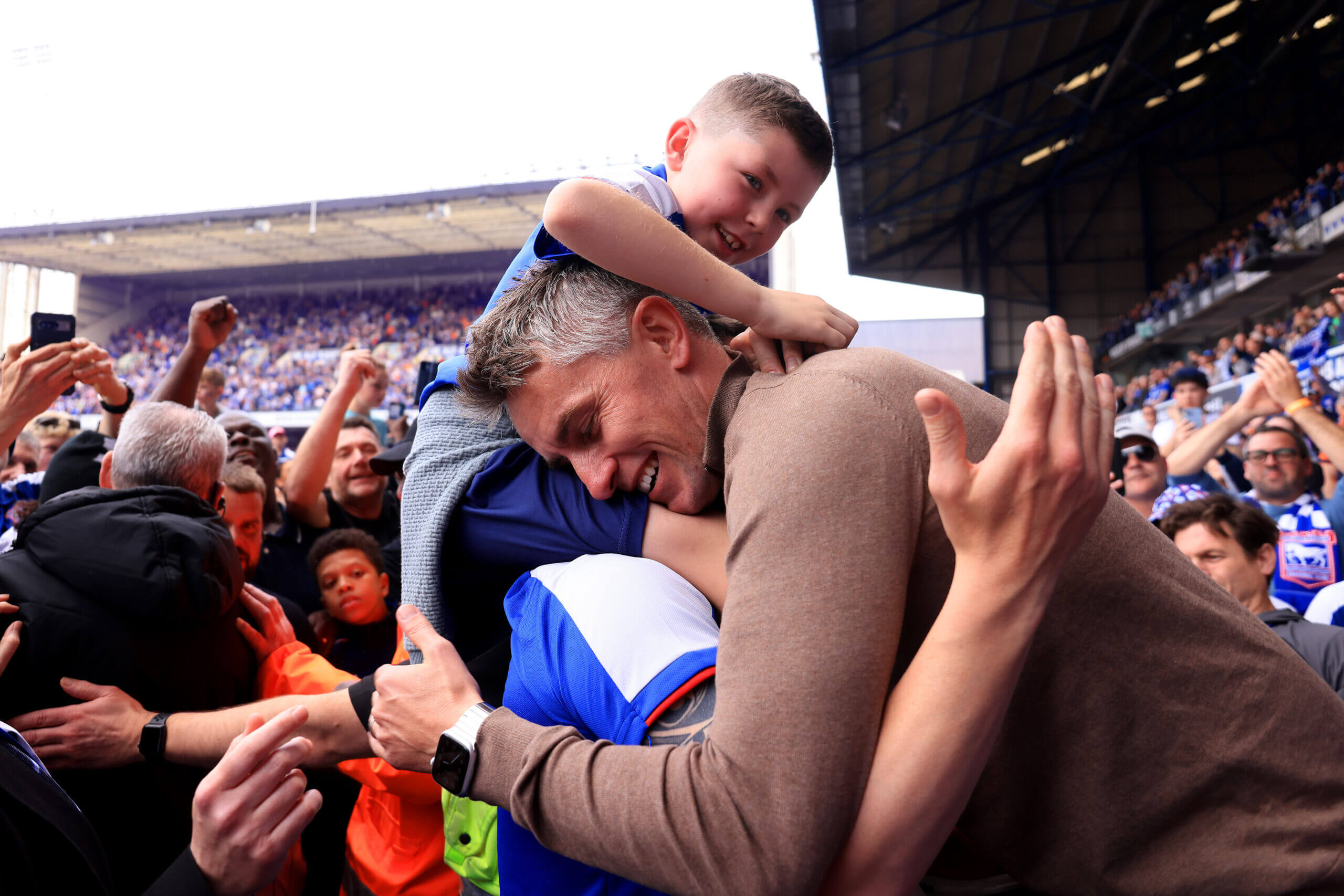
McKenna last year after promotion from the Championship (Stephen Pond/Getty Images)
The realpolitik of managerial contracts means there will be get-out clauses on both sides but, asked before the draw with Chelsea just over a week ago about his future and whether he will be at Ipswich come August, McKenna said: “Short answer is ‘yes’. I’m still happy here.
“As I’ve said after the game a few times, the club has a fantastically bright future in many, many different ways.
Advertisement
“I’m excited to be part of that, I’m proud to lead it. I’m proud to lead the club where we’re in League One, I’m proud to lead the club when we were in the Championship and I’m proud to lead the club now in the Premier League. That doesn’t change my perspective too much.”
The post-Arsenal reaction revealed supporters feel the same and, as some made for the train station, it was writ large on a series of banners. One hailed: “Marvellous McKenna and his band of Blues brothers”; another said: “You think Ipswich Town are going to wither away… Think again.” The local council has plastered signs on litter bins: “A proud Premier League town.”
That still applies, at least for another six days, but it’s on a mathematical technicality — West Ham, the only team Ipswich can catch, will not be caught. Kieran McKenna knows that; he also knows that if Ipswich bounce back, this time next year, he could be discussing a third promotion in four seasons, and the conversation around his name will change again.
(Top photo: Zac Goodwin/PA Images via Getty Images)


